#clinical experience
Explore tagged Tumblr posts
Note
omg congrats on getting into a grad school program! I am trying to go down a similar career path and i was wondering if you could talk a little about the experience you got during undergrad that helped you get into this program? Thank you:))
thank you!! <3
getting experiences were fairly tricky for me bc of covid, so it shouldn't be as hard for you, hopefully!! i didn't actively seek out research experience, i was primarily looking for clinical experience, but having the research experience was super helpful and i ended up really enjoying it (although i definitely don't want to continue down that road professionally).
for clinical experiences, i reached out to my clinical psych professor (honestly hated her, but she put me in touch with this organization where she was being trained which was the most phenomenal experience, so we're very grateful to her for that) and asked what organizations she thought might have summer internships for undergrad students. if you're looking in NYC, i can give you a few suggestions on places where you could start looking! <3 i ended up interning at this private practice for 2 years because they let me keep coming back—i got to learn things on the admin side, got my first experiences interacting with clients and parents in a clinical sense, and got practice talking with supervisors both getting/receiving feedback and asking questions.
for research experience, i emailed literally every single psychology professor at my school and asked if they had any research they needed assistance with (and, i said 'if not, would you be able to recommend another faculty member that I could reach out to? i'm very interested in gaining research experience!'). thankfully, the one who had an opening had work that i was happy to do! and i've stayed on that on and off for 2 years as well, because it's been easy, interesting, and super cool to be able to literally be writing the final research article now to be submitted to journals, after having done the clinical interviews 2 summers ago at the very beginning of the project:)
please let me know if you have any questions/if i should elaborate about any of these experiences!
i do not think you need either or both of these experiences to pursue psychology. I do think a lot of places like to see that you have experience. it's absolute shit that a lot of these experiences are unpaid. there are definitely scholarships and grants you can apply for, but that doesn't minimize the unpaidness of the work you're doing. if i can help at all, please let me know!!! <3 excited for you to explore this:)
#psychology#clinical psychology#psychology grad school#psychology internship#summer internship#college#university#undergrad internship#clinical experience#clinical psych#research#research experience#ich
6 notes
·
View notes
Text
If you’re passionate about helping others and looking to start a rewarding career in healthcare, becoming a Certified Nursing Assistant (CNA) is a fantastic first step. The journey to becoming a CNA may seem challenging, but with the right preparation, you can enter the healthcare field with confidence and skill. Our CNA Prep Course is designed to provide you with the essential training and knowledge needed to excel in this vital role.
1 note
·
View note
Text
1 note
·
View note
Text
Your Step-by-Step Guide to Becoming a Medical Assistant
Are you looking for a career in the healthcare field? Becoming a medical assistant can be an excellent choice for you. Medical assistants are in high demand and are essential members of healthcare teams. They perform various duties, from patient care to administrative tasks, making them a crucial component of any healthcare setting. If this sounds like a career path you want to pursue, here is…

View On WordPress
0 notes
Text
Just going to cry again (see: my previous post about the parallels between the storage room scene and the abandoned factory scene) about parallels and juxtapositions in the store room scene vs the one in Styles bedroom:


Both these scenes have such a tone of desperation and are characterised by an overflowing of emotions, but in drastically opposite directions.
(Note, some of what I say in this post directly relates to concepts and themes I talked about here, so it may not wholly make sense without that context.)
The scene in the storeroom is filled with frustrated desire. Fadel kisses Style because he wants Style's body and also wants to take his frustrations at Style out on his body. He doesn't need to look Style in the eye (and in fact very intentionally only does so only in small snatches) because this isn't about a connection as much as it is about a release. Fadel's kisses come fast, hard, and are intended to bruise more than to adore.
But episode 5's scene is filled with much more quiet and tender sort of desire. Style is kissing Fadel so much more slowly and purposefully. He keeps looking back at Fadel, checking in to see how he feels and whether Fadel is enjoying it. Everything Style wanted in Episode 3, he now gives to Fadel here, pours the secrets of his knowing and choosing Fadel anyway into the way he presses his lips onto Fadel's skin. His kisses linger, they carry a weight but are somehow infinitely gentle still; Style's kisses contain a purpose that Fadel's kisses couldn't in Episode 3 because in all honesty they were relative strangers back then.


There's also the way there's such a ferocity and carelessness in the way Fadel starts the encounter in episode 3 that is juxtaposed beautifully by the slow, tender, almost hesitant way Style slides his lips onto Fadel's. Both of them are in such different headspaces, between these episodes and its especially evident in the way they care so much more about the other person's comfort and how intentionally they showed that to the audience.


There's hunger present in both scenes but what this hunger is focused on is so drastically different. In the storeroom, they're both mainly focused on a physical release; its primal and visceral but lacked emotional resonance. Fadel gives Style what he knows Style wants (that hint of danger, with the hand on his neck), but its not because he really cares about what Style wants on anything more than a physical level. In Style's bedroom, however, Fadel is drunk (intentionally and by his own design) and desperate to open himself up to Style on an emotional level. Meanwhile, Style wants that desperately too, but knows that Fadel shouldn't because of his own terrible secret. So this kiss is what they both will allow themselves - an honesty and a hunger for this deeper connection they can only share in act but not in words.


In the storeroom, Style wants Fadel to want more than his body but knows (or thinks) he can't push for it yet, so he remains passive, lets Fadel do whatever he wants, lets him turn and shove and place Style how he wants because at this point, this is all Fadel will give him. Here, Style is passive in spite of what he wants. But in the bedroom, Fadel is passive because it's what he wants; he wants to let Style do whatever he desires to and with Fadel's body. He wants to lay himself as bare as he possibly can, which is only physical, and so he does.
And because the encounter in Episode 3 lacked that emotional connection, the focus is merely their respective releases. There's a sense of two people trying to find pleasure and 'finish' while remaining emotionally disconnected despite actively having sex with each other. Because in some ways, they didn't really need each other in that moment to get there (there's actually a lot of truth in what Fadel says about it being easier to just jerk off alone). In sharp contrast, the scene in Episode 5 isn't focused on the destination but on the journey. Style is taking his time and Fadel is letting him - Style is choosing to worship Fadel's body, with his fingers, with his lips, to respond to his vulnerability with gentleness and tenderness and adoration. The goal has stopped being about finding a release, it's about allowing both these men to revel in the giving and receiving of pleasure.
The point of these scenes is to show to us the ways in which Fadel and Style have grown to care for and, dare I say it, love each other in ways that are so purposefully portrayed by showing the nature of their physical connection. Because the ways in which these scenes are the same and yet so wholly different showcases how their touches are now no longer merely tied to their senses any longer, but also to their hearts as well.
#when i say i am OBSESSED ugh T_T#what joongdunk did in episode 5 just makes me appreciate and anew how much they're intentionally changing things each time#there's such care taken to portraying the characters growth and change of feelings and we are so blessed to be able to experience it!#the heart killers#the heart killers the series#fadelstyle#stylefadel#joongdunk#joong archen#dunk natachai#thk ep 5#thk ep 3#thk meta#hui talks thk#hui talks thai bl#shoutout to all the gifmakers because this post wasn't nearly as impactful with stills#i do wish there was a better way to search for gifs though TwT#also i've never been a colour analysis girl (because i don't know enough about it; not because i'm not interested...#i mostly don't know where to start)#but wow the lighting feels very intentional too: the cold and clinical shades of blue indicating the emotional distance between them#vs the warm and soft red/orange glow surrounding style's bedroom scene#yeah everything about these scene was so beautifully done and i'm so grateful we get to see it TwT
296 notes
·
View notes
Text
For some weird reason, I've always been fascinated by how wildly different Sampo operates in the Underground vs the Overworld.
Sampo is present in both places and even in official sources, he's not really counted as one side or the other- now that the theory has been confirmed in-game, he's generally just lumped in with the Masked Fools.
But there really is a big difference!
Probably the most obvious and well known instance of Sampo's...business practices *cough burglary and fraud COUGH* in the Overworld is from the Belobog Museum event. In it, you don't find out Sampo is the main culprit until near the end, because Pela has to set up a sting just to catch him in the act. And that sting is necessary all because the initial suspect they arrested, Norbert, had pretty much no idea of his partner's identity. Sampo wouldn't even speak to him face-to-face.

And whereas Sampo is normally very pleasant and friendly with the trailblazer...when he thinks he's talking to Norbert here, he straight up says that they are NOT friends. Like he really shuts that shit DOWN.

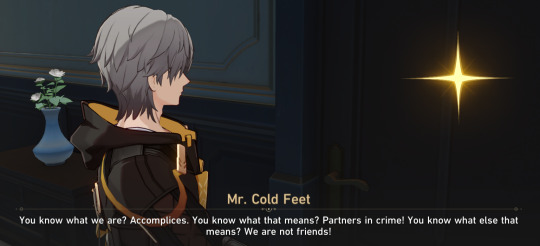
There's also an Overworld NPC, Chavez, who heads the "Dark Blue Scam Support Group." And he. Really really really does not like Sampo fjkdasjklfdj
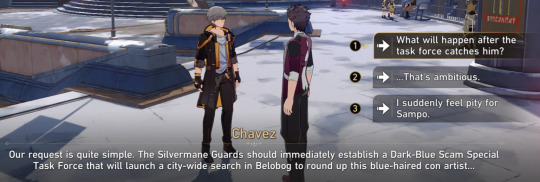
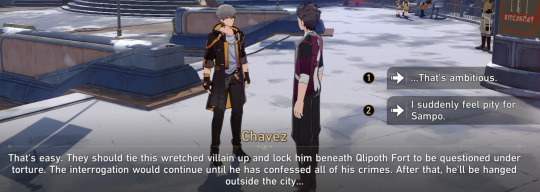
Chavez clearly wants Sampo caught, and has literally no positive feelings about him. So. Why call it the Dark Blue Scam? Why not just out him by name? Chavez obviously doesn't give a single shit about Sampo's dignity or privacy. But he never once refers to him as "Sampo," and even the pamphlets he passes out make no mention of it. No one in the entire support group seems to know how to identify him or how to refer to him except by his hair color. If the trailblazer says his name, Chavez reacts as though he's never heard it before.


(I've seen people say this means Sampo Koski is an alias and not his real name? But Ray pointed this out, and honestly I agree; even the Fools call him Sampo, after all. I think it's just that Chavez never knew Sampo's name in the first place, and given his immense distrust, immediately assumes it's an alias.)
And then there's his characters stories, where he proceeds to pull off a heist in the Overworld while in disguise as Brughel Poisson the entire time. Literally his own stories don't mention Sampo's name even once.
So anyway, all this shows that when he's up in the Overworld working cons, Sampo is incredibly slippery and secretive about his identity. The only people who seem to know him are Pela, Serval, and Gepard. He doesn't get close to anyone else, and is even surprisingly unfriendly. Nobody knows his name. No one knows his face. He has zero qualms about backstabbing or double-crossing, and even plans for it in some cases.
Meanwhile, down in the Underground, I'm pretty sure literally the worst thing we hear of him doing is scalping tickets in front of the Fight Club. Which isn't even illegal in a lot of places (although it's certainly a dick move).
In Hook's companion quest, a vagrant miner steals Fersman's equipment and tries to sell it to Sampo. Even before the trailblazer and Hook jump in and out the vagrant as a thief, Sampo hesitates to buy it because it sounds like stolen goods, which he doesn't want any part of.
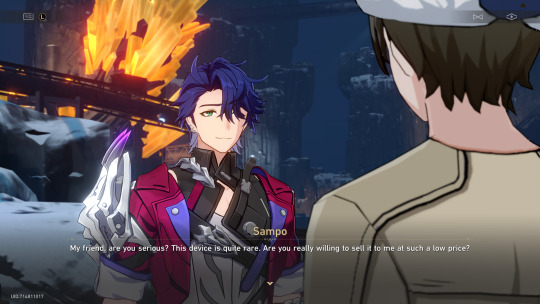
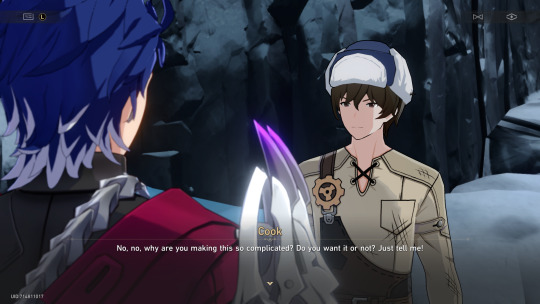
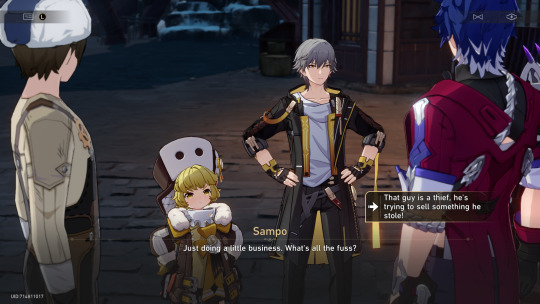
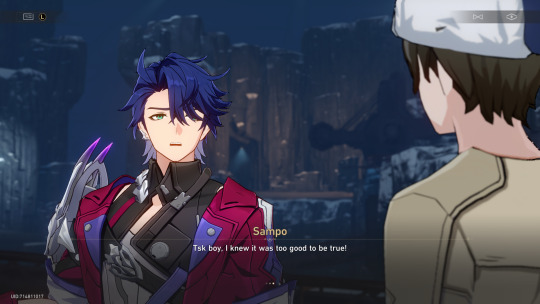
Even knowing that a geomarrow detector is rare and incredibly valuable in the mines, Sampo makes no attempt to double-cross Hook or profit off of her loss, and even tells her who to go to to get it fixed.
And my favorite example of Sampo in the Underground is the Survival Wisdom adventure mission. In it, Sampo starts up a business with Peak, another miner. And like. In wild contrast to all the cons he pulls above ground, Sampo is actually super nice and helpful here.
Just the same as with Hook's quest, Sampo talks to Peak face-to-face, with no disguises or barriers. When the trailblazer finds them, they're just in the Great Mine, no secretive meeting places. Peak knows Sampo, is familiar with him, and calls him by name. It's not even a con! There's nothing illegal going on; it really is just a business partnership. Peak is more than happy with their deal, he's even pretty enthusiastic about it, because thanks to Sampo he can now make enough money to get by while also accommodating his chronic fatigue.
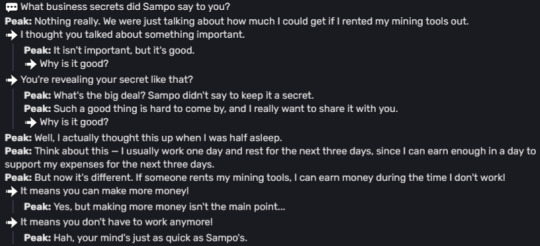
The only person Sampo lies to in this whole ordeal is the trailblazer, who he manipulates into getting Peak's mining equipment back from the vagrants that stole it in the first place. And when it's done, he rewards them with a legit treasure map.
So when he's working in the Underground, Sampo is MUCH more upright and lawful. Part of this is probably to do with his "business" model- Sampo only takes advantage of the wealthy, and poverty runs rampant in the Underground. When he charges Peak an extra 30% (the same percentage he charges Norbert as a consultation fee in the museum heists- Sampo seems to go by percentage instead of a flat rate, which means his prices are more fair for lower incomes) for carelessly losing their supply, Peak literally starts counting out pocket change.

Dude's working for pennies and good will down there dknsmdmd
And you can twist this into a Robin Hood thing if you want- Sampo IS technically working to feed orphans and heal the sick. He says himself he's more than happy to make up the shortfall between the greedy and the marginalized- I mean he says it in the shadiest way possible, but I doubt the people benefiting from his work really care that he's a slimeball if it means they can survive another day. Even the two heists he pulls in his character stories are literally just him stealing absurd amounts of food.
Personally though I think it is solely because of Natasha, and Sampo is hilariously well-behaved specifically for her, because she keeps him on a short leash JSKZJMSMSKS

#honkai star rail#sampotasha#hsr natasha#sampo koski#hsr sampo#hsr#today's post is brought to you by the letter Y. for the Yaps fdklsajfkd#'for some weird reason' I say only to realize through writing this post that the reason I like it so much is because I think-#-Natasha having Sampo by the short hairs is funny dkxjmskskdmdm#so sampotasha if you want or Sampo & Natasha if you want either or#I love Sampo behaving just for her because she holds a LOT of power in the Underground and he knows she could destroy him if she wanted#she could blacklist his business and run him out of Boulder Town if she really thought she needed to#Natasha exiled her own brother who eventually died in the cold because he was running unethical medical experiments on unknowing civilians#and granted what Sampo does is nowhere NEAR as bad as that but she also probably does not have nearly as much mercy for him dkdjdmkskd#I'd like to think they hold a decent amount of camaraderie for each other though. and maybe even some affection.#they work together like all the time after all. sampo is in the clinic with natasha so much that hook thought he was really sick.#and for as much as he relies on her for business she also relies on him for resources.#it's not really an exaggeration to say a LOT more people would be dead without Sampo constantly smuggling goods across the border.#maybe I should just make a post about their relationship sometime because I do very much love it skzjkskdk
219 notes
·
View notes
Text

please watch link click live action (2024) please please please
#link click#link click live action#synco talks#holy hell the experience going from lcla finale straight to bridon finale is INSANE it's unrivaled im gonna be sick im gonna. make gifs#the hero of one story the villain of another!!!#also the psychological clinic jumpscare lmfao#yingdu+lcla+stupid parallels#(not stupid)#and so the shitposts continue#every time someone's like omg dark insane lg destroying the world with his time powers for his loved one. im like. watch lcla watch lcla wa
69 notes
·
View notes
Text
Something I love about how Pride and Prejudice is told through an omnipresent narrator, aside from the witty remarks and insight into other characters it allows even though it's usually focused on Elizabeth, is how it plays on the audience's own prejudices and assumptions.
The narrator tells us very early on, chapter 4, that Darcy is "haughty, reserved, and fastidious, and his manners, though well-bred, were not inviting." We've already seen that when we meet him the previous chapter, and will see more of it in those following. But it's the readers, along with Elizabeth, who take that observation as not only a list of flaws (despite only the first actually being negative) but presumes even more damaging flaws must be attached to it. Darcy can be off-putting, especially so in the setting we meet him in: he dismissed Elizabeth within earshot of her, didn't engage with people attempting to converse with him, etc. It's easy to assume the worst of him in a world so driven by social niceties, and because we follow Elizabeth, who is so lively and playful amidst the rules which govern society. Elizabeth thinks he's bad tempered? It would make sense - he hasn't shown consideration for others much socially, why would he care when he's angry? He acted from resentment and jealousy and went against his father's will? That's not such a jump after the conclusion of a bad temper, his own acknowledgement of implacable resentment, and evidence of pride. The awareness of one offensive trait so naturally leads to prejudice against it, that we easily assume still worse qualities must exist. We are as mistaken as Elizabeth.
Even the idea that 'No, Darcy was never haughty or rude, he was just shy and misunderstood, the narrator is wrong' is just magnifying that prejudice. Yes, we do find out later that Darcy is not at ease among strangers, and was always intrinsically good; his morals and core values meant he was never as bad as Elizabeth believed. But that doesn't mean he was without flaws, and it's so fascinating that some analysis of his character seek to completely remove the negative traits which he eventually overcame after acknowledging them in himself. The logic seems to be that they feel if he had them in the start that he isn't actually such a good person. It's just another example of being so prejudiced against certain flaws that it's impossible for some people to reconcile that there doesn't have to be more serious failings attached, and someone can still be a good person despite being arrogant and not always nice. It's, ironically, being prejudiced in the exact same way that Elizabeth was at the start of the novel. It's amazing that Jane Austen was able to tap into that aspect of human nature so deftly, and invoke in both in her main character, and readers to this day.
Now, of course, the story is so well known it's rare for anyone to read it blind, so it's less likely anyone will be unaware of Darcy's good qualities despite first seeing his worst. Even if they do, Pride and Prejudice has become so genre defining that new readers who are the slightest bit genre savvy will be more aware than contemporary audiences were. But even if we know the story it's still so understandable why Elizabeth feels the way she does. We see what she sees and feel her conclusions make sense. Just as, even though the narrator tells us Darcy is starting to catch feelings for Elizabeth, we fully comprehend her not noticing and believing there's a mutual dislike. And though that is concrete evidence of Elizabeth not reading Darcy and his motives correctly, we are still so sympathetic of the basis of her prejudice that her continued belief in Darcy's lack of virtues makes sense from her point of view. We can see, as she later will, that she takes it too far, and should have noticed evidence to the contrary, but her prejudice against him based on his early behaviour and her pride at reading people correctly is so understandable.
Basically, in a story about the characters' pride and prejudices, I love, love, LOVE how the narrator's voice brings out those same traits in readers the exact same way we see it presenting in Elizabeth. We're all on that journey with her, and we can likewise learn the same lessons about ourselves as she does. Pride and Prejudice feels timeless, because even though society and thus the nuance changes, the book is about human nature, and that remains essentially the same.
#pride and prejudice#jane austen#discourse#elizabeth bennet#fitzwilliam darcy#i do think P&P does this more than Persuasion or S&S#S&S has each stance exemplified by two different characters and we observe rather than experience the same journey ourselves#Persuasion features SO many different types of persuasion and analyses them and explores the well meaning/self-serving applications of them#and that the effects can be good or bad despite the motive and all the nuance of 'when do we have the right or duty to persuade others'#but that's still a more clinical look at it and we're aware we're analysing it#but P&P really makes us PART of the titular experience and I think so many people don't realise it#I think it's a huge reason of why the novel is so satisfying
167 notes
·
View notes
Text

reassassination swap AU... fuckin.... unassassination idfk
#zeno's art#ocs#reassassination#vivica de la crux#octavia krankenstein#dr rigor krankenstein#lunette strikewhite#WEEE this one is fun#vivi is obv swapped with octavia#so she's less skittish and crazy and eager to please and more calm . still judgy as fuck tho#octavia is swapped with kranken so instead of being cool and badass she's got several screws loose#triesto seem calm and collected but really shes obsessive n overworked and unstable and a littttle bit of a total freakazoid#kranken is swapped with .... idk. lets just say the krankenstein clinic takes the role of the clear crucifix org#like instead of a clinic its a whole hospital now where kranken does crazy experiments and shit and isn't questioned cuz hes so respected#i think he was prob like canon krank before lobotomising himself so now hes just scarily quiet and soulless#but still a sadist lol#like hurting others is the only way he can feel any emotion now#lunette is swapped with umm ONCE AGAIN IDK!!! oh well. her cult replaces the clinic here#her personality is the most similar to canon shes just a bit more desperate and a little insecure#for other characters - onion is like ummm idk a wannabe scientist#if octavia is kranken's apprentice onion is octavia's#hmm idk#but i love this AU#in fact ive had it for a while i just never posted about it i dont think#but redesigning everyone was fun esp vivica's outfit its my absolute fave
121 notes
·
View notes
Text










WATSON (2025)
#same producer as elementary is getting me going#the fact that sherlock 'dies' and watson still has the apartment opened a clinic after Holmes and uses his magnifying glass? okay STOP 😭#cant forget the casebook and all his science experiment equipment still there (the box perhaps hes packing everything??)#john watson#watson#cbs watson#morris chestnut#sherlock#sherlock holmes#elementary#cbs elementary#elementary sherlock#johnlock#reichenbach#the final problem
57 notes
·
View notes
Text
Just read Lilly Jay’s divorce essay and wow, even though the circumstances are wildly different, the loosely similar theme to TTPD of speaking your saddest story to reclaim your personhood (in the public eye) and share your truth with others to help heal are quite striking to me.
The “sponge works best when it’s wet” metaphor seems pretty apt too.
#like in her case the fact of going public literally jeopardizes her career because it relies on clinical anonymity#but the tradeoff of being seen as human and of knowing she’s been through these things too#may help others find comfort in her work and in sharing their own experiences#feels extremely appropriate here#also the whole moving to a foreign country for your partner only for the#them to abandon you but 🥴#and also the part about grieving the life you’d dreamed of of your future family#and also how sometimes the parts you love the most about your partner are the parts of yourself you’ve projected onto them#and that you can take that with you after it’s over because that’s you
30 notes
·
View notes
Text
forgot to tell u guys my unemployment era has ended
#got hired at a vet clinic by my house !!!!#i really like it so far i think im gonna get a lot of hands on experience#also decided i am going back for my masters before vet school#hoping to boost my GPA (and get more volunteer opportunities)#anyway yeah just a lil update#for all one of u who read these tags LOL#jess talks
31 notes
·
View notes
Text
I went to my appointment and found out that I don’t have cancer anymore.
Then I got home to a letter that I don’t have a job to go back to. Fired for “failure to return from leave.”
I need a fucking drink.
#metastatic breast cancer#the final post to that hashtag#bariatric clinic job#that tag’s going away too#time to scramble#insertcaffeine vs alcohol#any Colorado friends have experience with unemployment?#I get a new lease on life but at what cost?
64 notes
·
View notes
Text
i keep pretty tight lipped irl about my feelings about the field of psychology but ive taken enough courses in it and studied enough adjacent subjects to feel very set in my beliefs that it is kind of like playing pretend for grown ups who want to look smart. and if you throw enough stuff at a wall some of it might stick. especially if you put glue on it.
#im post#mostly referring to clinical psychology but honestly all of it to some extent is like that . thats just what i have the most experience in
21 notes
·
View notes
Text
Childish Jealousy L card
[ edit: i've read the card prologue and added my thoughts under the cut + a bit of a rant ]
my initial thoughts:
Just a shot in the dark yk,,,,
Will the card's H scene be them being a pair of high schoolers getting frisky in an empty classroom after school?
Yk, fucky wucky magic and Levi's personality aside
That's,,,,
That's pretty tame? Imo at least
Huh,,,,,
I've done and seen worse when i was in high school
childish jealousy is really a fitting name for this L card cuz that's the whole motivation for it 😭
can't believe he put the entirety of Gehenna castle to sleep and strut around like they own the place (also Foras splashing tea on the sleeping Sitri lmaoooo u bitch)
also saying that Asmodeus is in charge of regulating that particular substance,,,,,interesting
bruh Levi just Thanos snapped Minhyeok into non-existence jgjdhfjsnsndngkdn poor baby
so MC is mildly aware of what's going on
the pair go about the school day w MC being an absolute total klutz (idk if it's because of how the dream is set up or if that's how the day actually went but holy shit bestie how are you that disorganised????)
Levi acting like a disgruntled mom friend is not what i expected
o yea he also strangled a student but eeeehh 🤷♀️
"your heart goes thump when you're being as honest as a devil" something something,,,okayyy maybe that's when MC became more honest about their desires 🤔
and the dreamspace yeeted all the other students away
heh people really went off the rails when they saw the words "childish" and "Children's Day" on the banner without knowing the context
Children's Day was only mentioned in passing when MC was reminiscing and from the bit of research I did on the holiday, when kids turn 13, that's their last time to celebrate it cuz they're no longer children
so yea children have NOTHING to do w the event AT ALL (obviously) (i still stand by what i said in one of my reblogs re: this event when it was first announced)
so it really is just a role playing scenario in a school setting w some mild uniform kink maybe (i saw a post of part 2 and MC was turned back into an adult)
and like, they didn't even do anything when MC was their high school self 😭
eeeeyyyyy glad to know that my hunch was correct 🦐 still won't be pulling for this card but I appreciate the art and the ass hehehehe
#what in hell is bad#whb#prettybusy what in “hell” is bad?#what in “hell” is bad?#whb leviathan#🦐:ramblings#my high school experience was#smth else#someone got possessed and spread a lil bit of mass hysteria lmaoooo#what a way to cancel classes#post edit stuff#IM CACKLING#levi is me fr fr when dealing w my friends#bestie u such a fckin klutz tripping on flat ground#come here lemme get u to the clinic#i'll talk to our teacher dw#but u still a fckin klutz tho lmaoooo
61 notes
·
View notes
Text
It's been a long week, y'all.
#personal#dear diary#it sure is Monday!#i'm sick#i had to get up at 5:30am#i almost passed out in surgery#my second clinic patient was EXTREMELY complicated#and i did a solo pap smear for the first time#all the clinic stuff was good experience and my preceptor today was SO reassuring and supportive#but i am Le Tired
37 notes
·
View notes